
You’re learning a new system at work. Everyone else seems to pick it up in the first training session. You’re on your third tutorial, taking notes, rewinding sections.
And instead of thinking “I’m learning,” you’re thinking: “What’s wrong with me?”
If that moment feels familiar, you may be caught in the Natural Genius pattern, one of the quietest yet most discouraging forms of imposter syndrome.
For thoughtful, high-achieving professionals, effort can feel like failure. When your identity is built around ease and excellence, struggle feels like exposure.
But growth rarely feels graceful.
If these thoughts sound familiar, you may be caught in the Natural Genius Imposter Syndrome pattern, one of the quietest yet most discouraging patterns of natural genius imposter syndrome.
For many quiet high-achievers, thoughtful, internally driven professionals who value competence but often feel unseen, effort can feel like failure. When your identity is built around ease and excellence, struggle can feel like exposure.
But growth rarely feels graceful. Learning requires friction, vulnerability, and repetition. The goal is not to protect an image of competence but to strengthen your capacity to keep showing up, even when something feels hard.
Understanding where that pressure comes from is the first step toward loosening its grip. Let’s look more closely at what this pattern really is and why it takes hold so easily
WHAT THE NATURAL GENIUS TRAP IS
The natural genius imposter syndrome pattern is the belief that competence should come effortlessly and that truly capable people don’t have to try too hard. At its heart, this pattern transforms effort into shame.
High-achievers caught in it equate ease with worth. When they hit a learning curve, they don’t just feel frustrated; they feel fraudulent.
It sounds like:
“If I can’t pick it up right away, l’m not cut out for it.”
“Other people learn faster. What’s wrong with me?”
“I should already know this.”
This isn’t arrogance. It’s anxiety disguised as competence.
Foundational research by Clance & Imes (1978) identified this phenomenon among high-achieving women who doubted their own success. Valerie Young (2011) later refined it into distinct subtypes, including the Natural Genius – those who measure intelligence by speed and ease rather than persistence.
Every career, relationship, or creative endeavor eventually requires humility and continued growth.
When “smart” becomes a fixed identity, curiosity turns into fear.
Where the natural genius trap Begins
This pattern usually starts early.
Many who fall into natural genius imposter syndrome were told they were “so smart,” “so talented,” or “a natural.” Praise felt good, but it came with an invisible condition: your value lies in being exceptional without effort.
Research by Carol Dweck (2006) shows that children praised for intelligence instead of persistence develop a fixed mindset i.e., believing ability is innate. In a landmark study, Mueller & Dweck (1998) found that students praised for being smart avoided challenge, while those praised for effort embraced it and performed better.
When early praise centers on results rather than process, a powerful message forms inside:
Struggle feels dangerous. Ease feels safe.
As that message repeats, the nervous system learns to interpret difficulty as threat. Even as an adult, this wiring can trigger anxiety at the first sign of uncertainty.
These early lessons don’t disappear with age; they evolve into adult patterns of self-doubt and over-control, especially in high-achieving environments where performance still feels tied to worth.
Once those beliefs settle in, they begin to shape how we approach everything from learning new skills to leading teams. What once protected us in childhood starts to quietly limit us in adulthood.
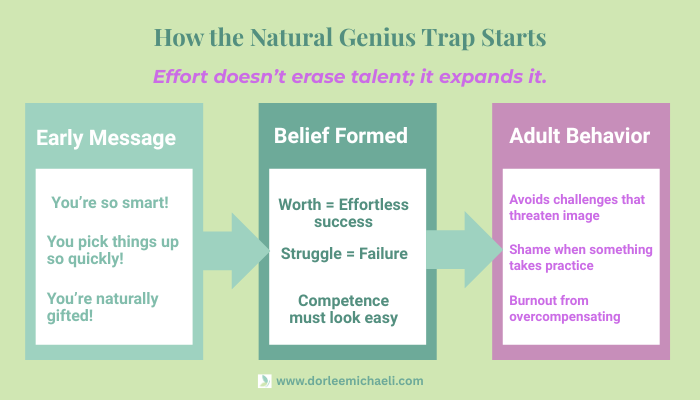
How It Shows Up for Quiet High-Achievers
Because the Natural Genius pattern looks like competence, it often hides in plain sight.
DO YOU RECOGNIZE YOURSELF HERE?
Take a moment to check if these patterns feel familiar:
☐ You avoid new projects unless you’re sure you’ll excel immediately
☐ You downplay your strengths when tasks come easily (“It’s not that hard”)
☐ You abandon hobbies or goals once they require sustained practice
☐ You feel embarrassed asking for help or clarification
☐ You compare yourself to people who learn faster
☐ You experience physical tension (tight chest, jaw, or stomach) when you can’t perform at a high level
If 3 or more resonate, you’re experiencing the Natural Genius pattern of imposter syndrome.
Keep reading. Understanding where this comes from is the first step toward loosening its grip.
These behaviors don’t come from laziness. They’re acts of self-protection.
Consider a few examples:
- A physician hesitates to consult a specialist, fearing it makes her look unqualified.
- A designer avoids learning a new tool, convinced confusion means she’s falling behind.
- A manager resists leadership training because she “should already know how to lead.”
In each scenario, the person is protecting identity rather than expanding potential. The fear is not of failing; it’s of being seen learning.
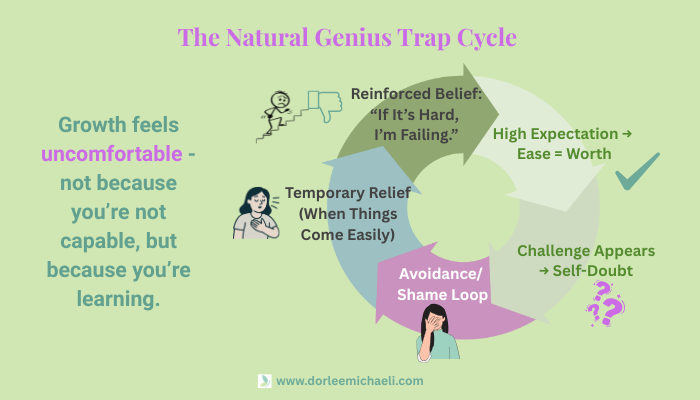
The Nervous System and the Natural Genius
From a trauma-informed perspective, natural genius imposter syndrome is a safety strategy.
If approval was once earned through ease, your body learned that effort could be dangerous. Each struggle may now trigger a subtle threat response, the urge to withdraw, over-prepare, or perfect before proceeding.
Stephen Porges’s (2011) polyvagal theory shows that safety depends less on logic and more on how the body reads social cues. A teacher’s sigh, a parent’s silence, or laughter from peers may once have meant rejection. Over time, those moments become an internal rule: “If I don’t know something right away, I’m unsafe.”
As Bessel van der Kolk (2014) notes, the body remembers what the mind forgets. Even when your adult self knows you’re competent, your body may still brace for humiliation.
Therapies such as EMDR can help reprocess these early experiences so effort no longer activates threat. Once your nervous system learns that uncertainty can coexist with safety, growth begins to feel expansive rather than exposing.
With awareness and practice, it becomes possible to unlearn these old reflexes. The next step is to translate that insight into practical ways of relating to yourself differently.
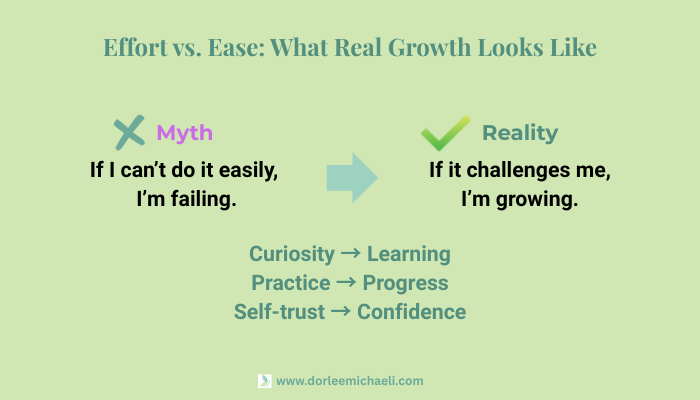
How to Begin Shifting the Pattern
You don’t have to give up excellence. The goal is to redefine what “capable” means so it includes effort, curiosity, and imperfection.
- Normalize Struggle as a Sign of Growth
Struggle doesn’t mean failure; it means your brain is building new pathways. Muscles strengthen through resistance, as confidence does. - Catch the Self-Talk
When you hear “I should already know this,” pause and respond kindly:
“It’s okay to be learning. I’m allowed to take my time.”
- Reframe Effort as Intelligence in Motion
Effort isn’t the opposite of ability; it’s how ability grows.
As Dweck (2006) showed, confidence expands most in those who persist through challenges. - Find Environments That Value Curiosity
Surround yourself with mentors and teams who view questions as strength. Over time, you’ll associate visibility with connection, not exposure. - Rest Instead of Over-Correcting
When discomfort arises, the Natural Genius tends to double down. Instead, pause. Rest consolidates learning and allows integration. Confidence grows in both effort and recovery. - Practice Compassion Toward the Protective Part of You
That inner voice insisting you “should already know” is trying to shield you from shame.
You can thank it, and gently remind yourself:
“Trying doesn’t make me less capable. It makes me real.”
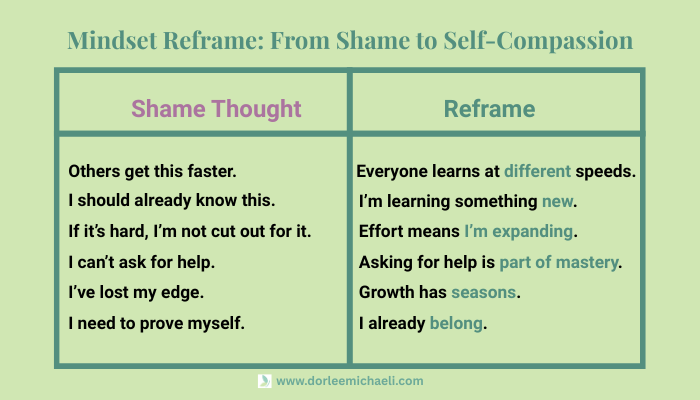
How to Begin Releasing the Expert Trap
You don’t need to abandon excellence. The work is learning to trust that confidence can coexist with uncertainty.
Healing the Expert Trap imposter syndrome pattern starts with learning to trust yourself even when you don’t feel fully ready.
Redefine What Expertise Means
True expertise isn’t omniscience; it’s curiosity, humility, and adaptability.
True mastery includes room for growth.Ask yourself: Can being human be part of being skilled?
2. Adopt a Growth Mindset
Research by psychologist Carol Dweck shows that people who hold a growth mindset, the belief that ability develops through effort and feedback, learn faster and recover more easily from mistakes.
Try shifting from “I should already know this” to “I’m still learning this.”
This simple reframe moves you from proving your worth to expanding it, freeing you from the endless loop of needing to know more before you can act. (Dweck, C. S., 2006)
3. Notice When Learning Becomes Avoidance
Before enrolling in another course, pause: “What am I afraid might happen if I don’t?”
If the answer involves judgment or exposure, you’re protecting, not progressing.
4. Practice Imperfect Action
Speak up before you feel 100 percent ready.
Send the draft. Volunteer the idea.
Confidence doesn’t precede action; it grows from it.
Reflection: What’s one situation this week where you could speak up or act before you feel fully prepared?
Reclaiming a Growth Mindset
Developing a growth mindset,the belief that intelligence and skill expand through effort, is one of the most effective ways to counteract natural genius imposter syndrome.
Notice when you interpret challenge as failure. Then shift the question from “Am I good at this?” to “What can this teach me?”
Research shows that people who adopt this mindset persist longer, perform better under stress, and feel greater satisfaction. The change begins not with talent but with trust in the process.
As you start to challenge these old beliefs, it’s normal to have questions. Here are a few I often hear from clients working through this pattern.
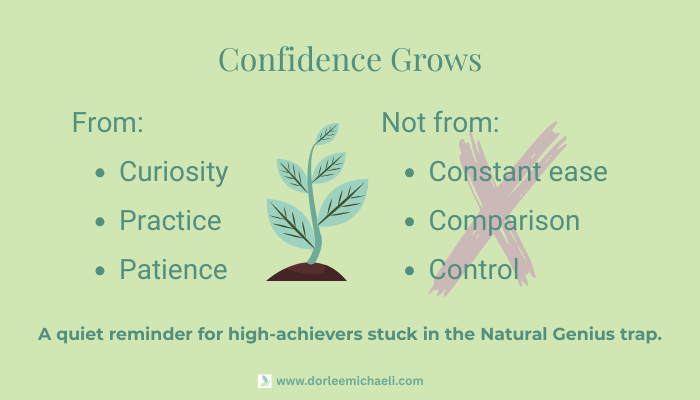
No, the natural genius imposter syndrome pattern and perfectionism are related but distinct.
Perfectionism focuses on achieving flawless results and fears making mistakes in the final product.
The natural genius pattern, however, focuses on the learning process itself, believing that competence should come effortlessly and that needing to try hard means you’re not truly capable.
Someone with perfectionism might spend weeks perfecting a presentation, while someone caught in the natural genius trap might avoid learning a new skill entirely because they can’t master it immediately.
Both patterns can coexist, but they require different approaches: perfectionism needs work on self-compassion around results, while the natural genius pattern needs nervous system work around the safety of effort itself.
Yes, therapy can be highly effective for the natural genius imposter syndrome pattern, especially trauma-informed approaches like EMDR (Eye Movement Desensitization and Reprocessing).
These therapies help your nervous system stop equating effort with danger by reprocessing early experiences where struggle led to shame, criticism, or withdrawal of approval.
When your body learned that ease equals safety and effort signals threat, that association gets stored at a physiological level.
Therapy helps rewire these automatic responses so that learning curves no longer trigger a threat response.
Many people also benefit from working with therapists who understand polyvagal theory and can help you recognize when your nervous system is activated, allowing you to build tolerance for the discomfort that naturally accompanies growth.
Natural genius imposter syndrome is one of five imposter syndrome subtypes identified by Dr. Valerie Young (2011) in her research on high-achieving professionals. It often overlaps with the Expert Trap pattern, where confidence depends on knowing everything before taking action.
Both patterns share a fear of being exposed as less capable than others perceive you to be.
However, the natural genius pattern specifically focuses on speed and ease of learning. If you can’t pick something up quickly, you feel fraudulent.
The Expert Trap focuses on breadth of knowledge. If you don’t know everything about a topic, you feel unqualified.
Many quiet high-achievers experience both patterns simultaneously: avoiding new challenges unless they can master them quickly (natural genius) and endless preparation before feeling ready to act (expert trap).
Understanding which pattern is most active helps target the right interventions.
Breaking the natural genius imposter syndrome pattern starts with noticing your body’s response to difficulty.
When effort brings tension, tightness in your chest or jaw, or harsh self-criticism, pause and take a few deep breaths.
This physiological response is your nervous system treating learning as a threat.
Begin with small experiments: choose one low-stakes situation where you allow yourself to be visibly learning: ask a clarifying question, admit you’re still figuring something out, or practice a new skill in front of someone safe.
Notice what happens when you’re not effortlessly excellent. Most importantly, reframe effort as intelligence in motion rather than evidence of inadequacy.
Research by Carol Dweck shows that people who adopt this growth mindset, believing ability develops through practice, persist longer and perform better.
Start by catching the thought “I should already know this” and gently responding: “It’s okay to be learning. I’m allowed to take my time.”
A growth mindset, the belief that abilities develop through effort and learning, is one tool for addressing natural genius imposter syndrome, but it’s not the complete solution.
The natural genius pattern isn’t just about beliefs; it’s wired into your nervous system from early experiences where ease was rewarded and struggle felt dangerous.
You might intellectually understand that effort leads to growth, but your body still activates a threat response when you hit a learning curve.
This is why cognitive reframing alone often isn’t enough. Effective healing requires both mindset work (reframing how you think about effort) and nervous system work (helping your body feel safe during the discomfort of learning).
Trauma-informed therapies like EMDR can address the physiological component, while growth mindset practices address the cognitive component. Together, they create lasting change.
Yes, natural genius imposter syndrome can develop even without explicit “you’re so smart” praise in childhood.
Some people develop this pattern from observing siblings or peers who seemed to learn effortlessly, leading to the internalized belief that ease equals intelligence.
Others experienced environments where mistakes were met with criticism or disappointment, teaching them that struggle itself is dangerous regardless of the eventual outcome.
Workplace cultures that only celebrate quick wins and natural talent can also reinforce this pattern in adulthood. Additionally, some people with neurodivergence (like ADHD or giftedness) experience both effortless mastery in their areas of strength and intense struggle outside those areas, leading to confusion about whether difficulty means incompetence.
The pattern can emerge from any experience that taught you to associate your worth with ease rather than persistence.
Closing Thoughts and Next Steps
You’re not failing because something takes effort. You’re learning in real time.
Every stretch, every moment of confusion, every time you resist the urge to quit is proof that your confidence is deepening.
Effort doesn’t diminish your intelligence; it strengthens it.
If this post resonated, explore the full Imposter Syndrome Series to understand your patterns and learn gentle, practical ways to shift them.
This is Part 6 of the series for quiet, high-achieving professionals.
- Part 5: The Expert Trap: Why “Never Knowing Enough” Keeps You Stuck
- Part 7 (coming soon): The Superwoman Pattern: Why Capable Women Feel They Can Never Rest
References/Further reading
Brown, B. (2012). Daring Greatly. Gotham Books.
Clance, P. R., & Imes, S. A. (1978). The Imposter Phenomenon in High-Achieving Women. Psychotherapy: Theory, Research & Practice, 15(3), 241–247.
Dweck, C. (2006). Mindset: The New Psychology of Success. Random House.
Mueller, C. M., & Dweck, C. S. (1998). Praise for intelligence can undermine children’s motivation and performance.Journal of Personality and Social Psychology, 75(1), 33–52.
Neff, K. D. (2003). Self-Compassion and Psychological Well-Being. Self and Identity, 2(3), 223–250.
Porges, S. W. (2011). The Polyvagal Theory. W. W. Norton & Company.
van der Kolk, B. (2014). The Body Keeps the Score. Penguin Books.
Young, V. (2011). The Secret Thoughts of Successful Women. Crown Publishing.
Published: November 16, 2025
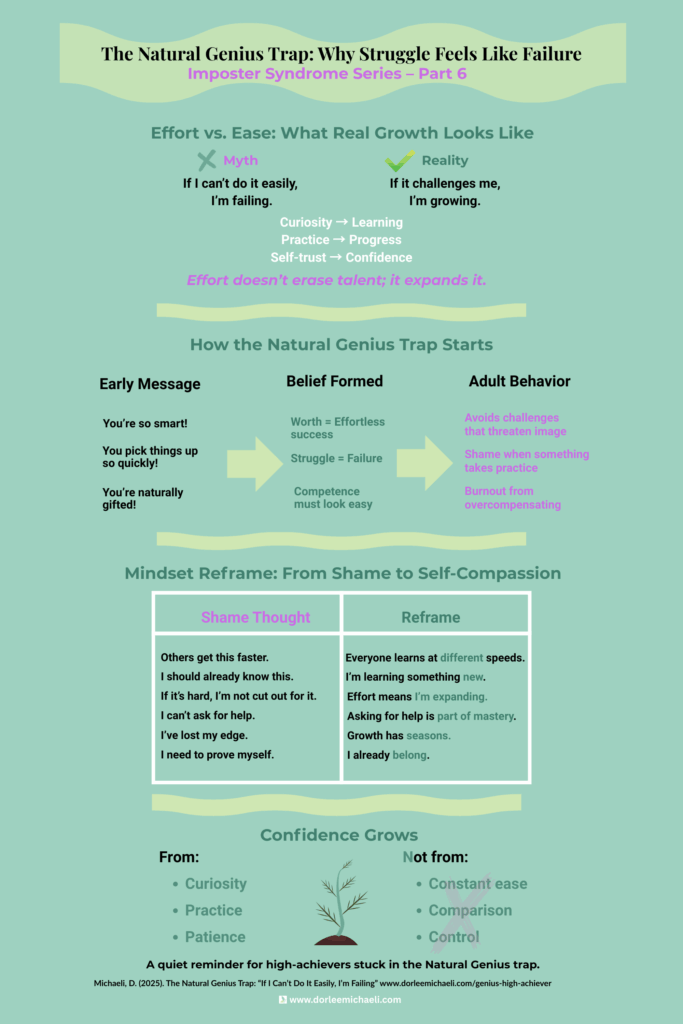
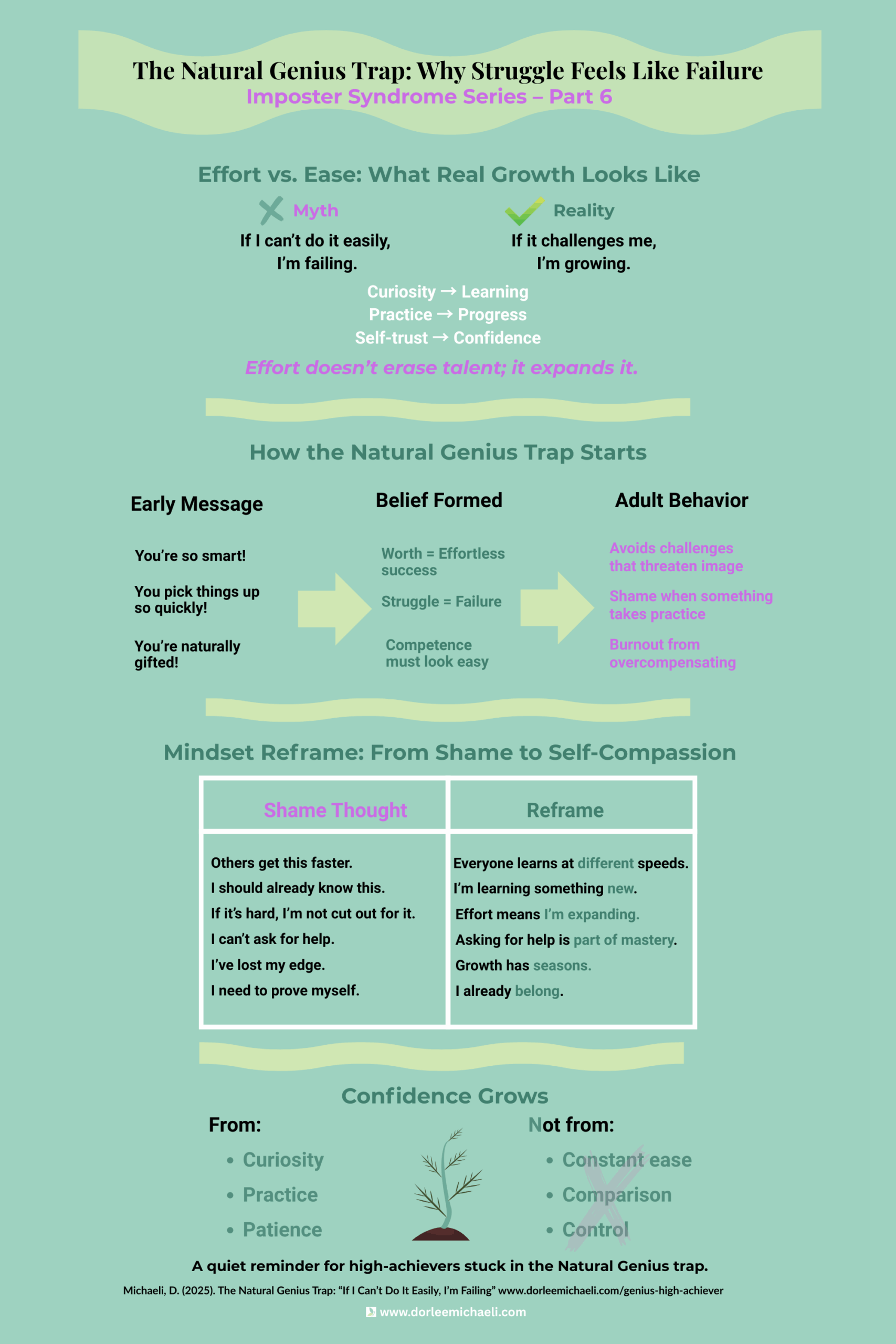
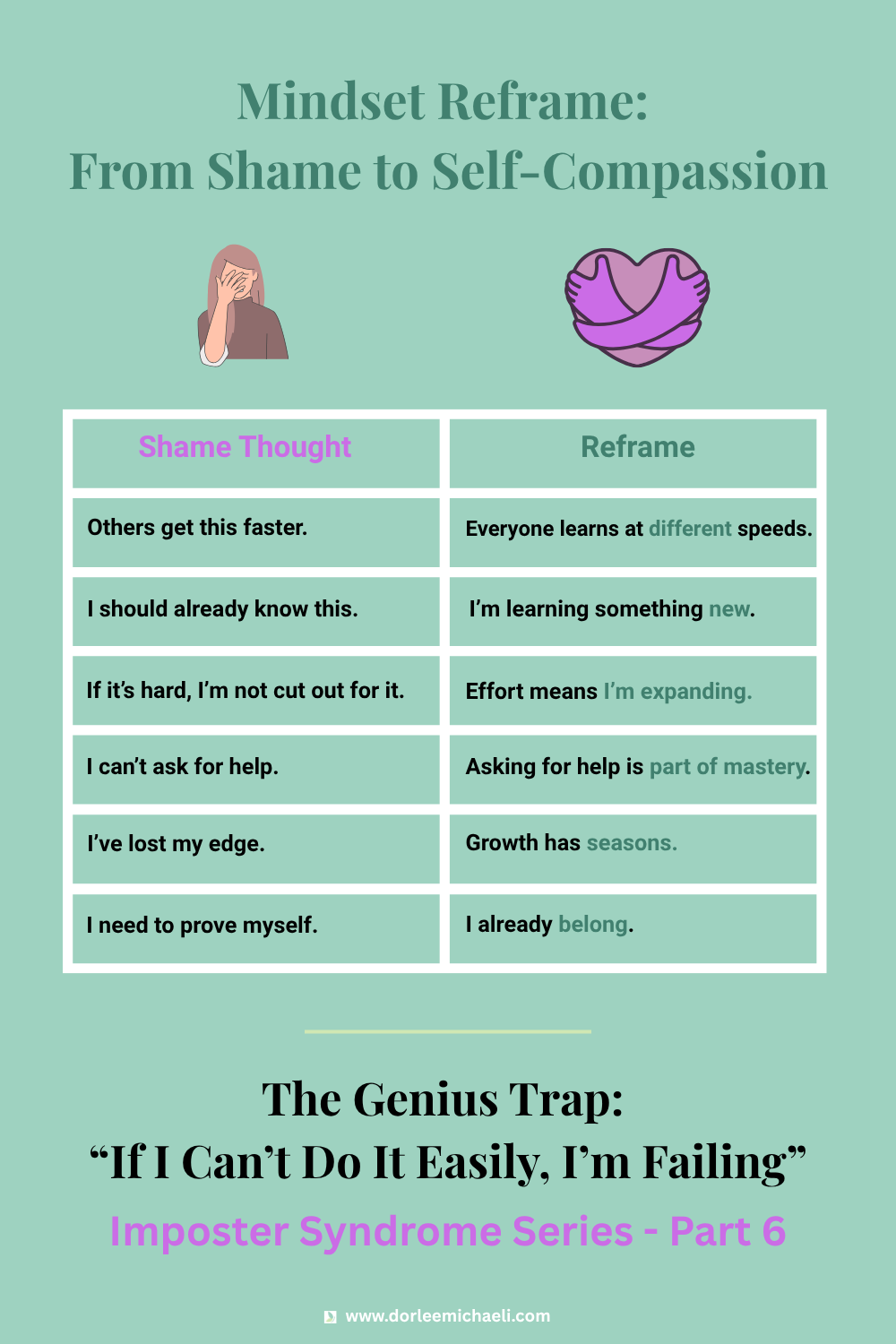
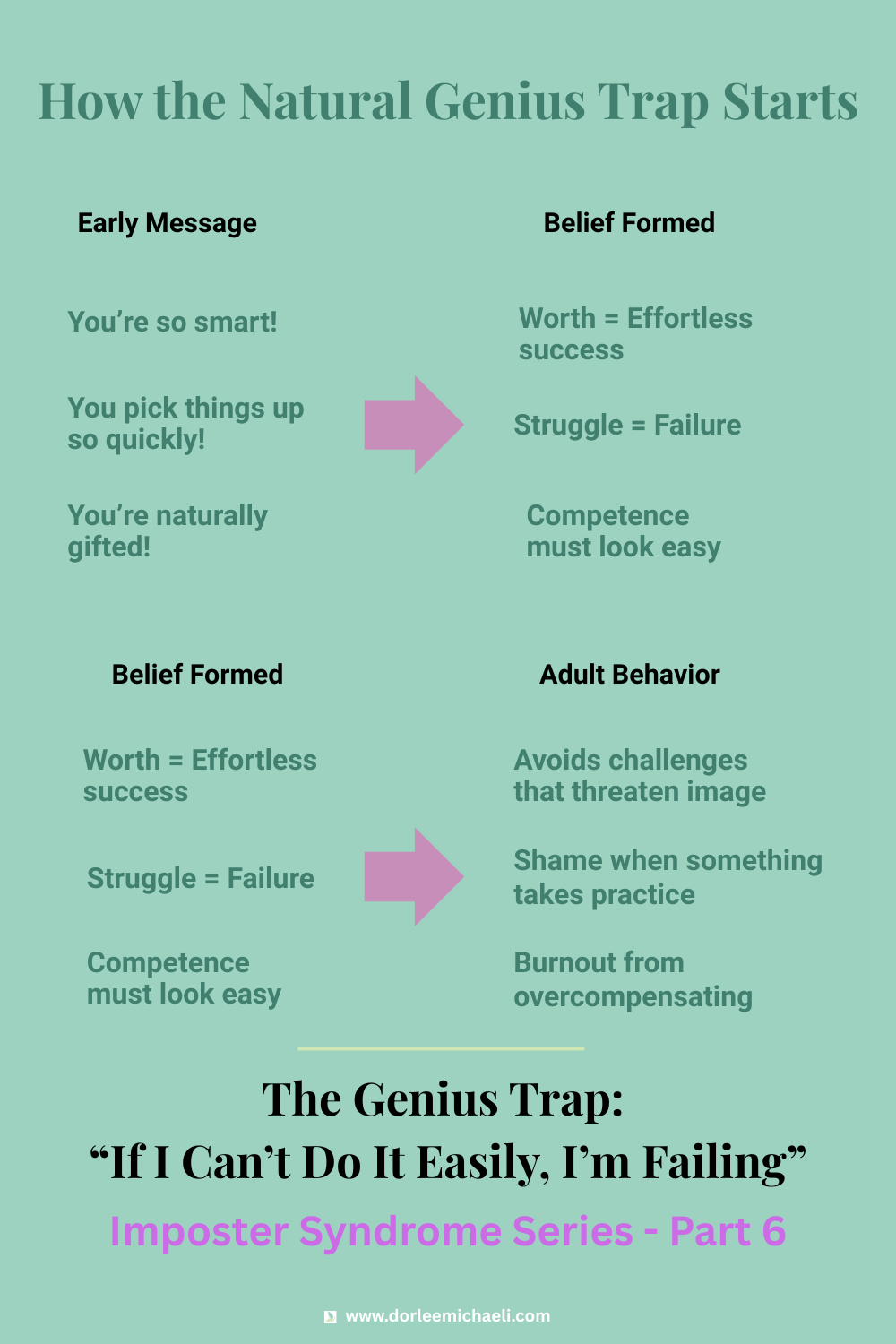
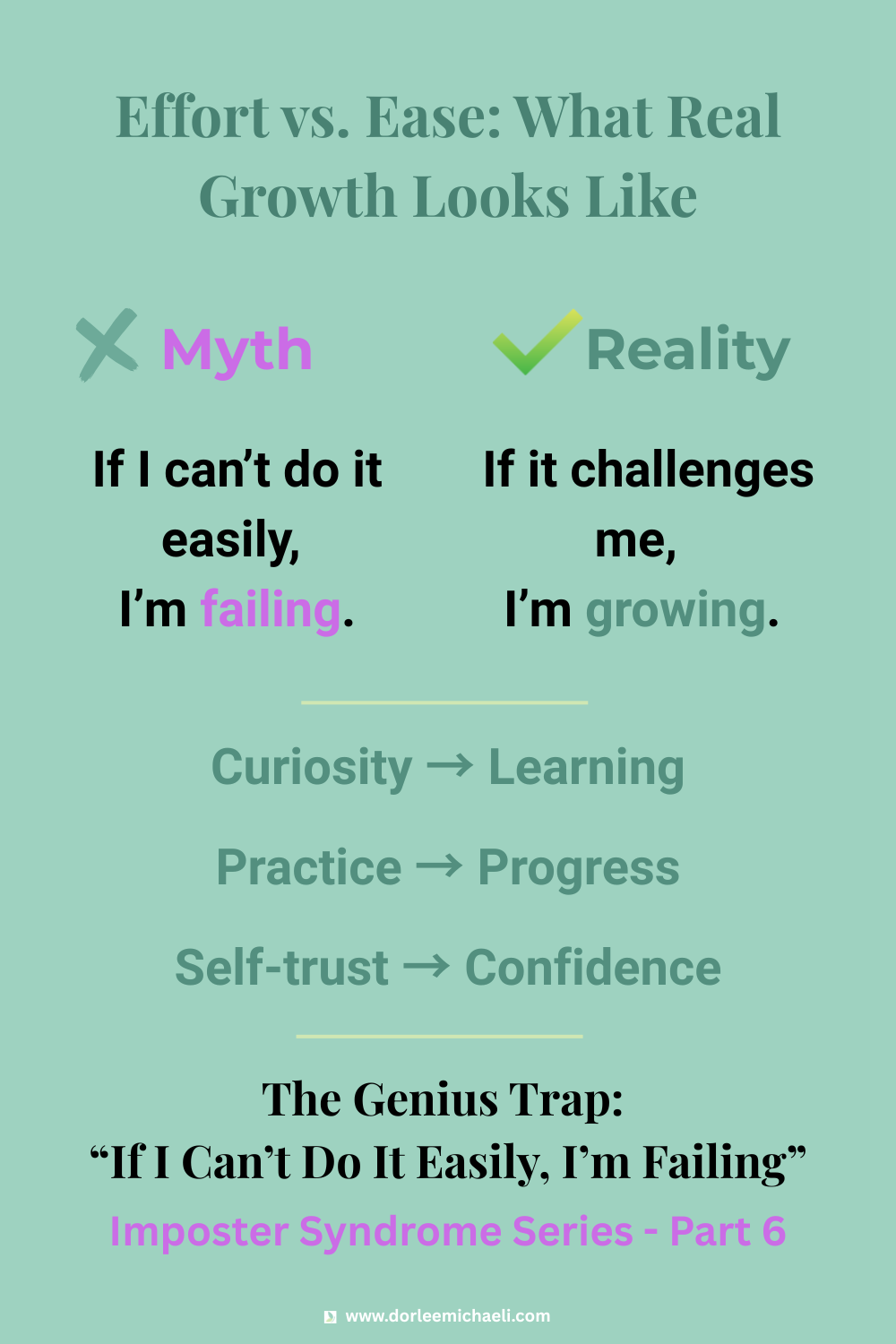




This one really landed. The way you describe the Natural Genius pattern feels so spot-on, especially that quiet belief that effort somehow means we’re slipping instead of growing. I’ve definitely bumped up against that old wiring myself. I appreciate how clearly you break it down and how much compassion you bring to the process of unlearning it. Your whole series has been so insightful, and I know many people will see themselves in this one. Thank you for naming something so many experience but rarely talk about.
Thank you so much for this thoughtful comment, Cheryl. That hidden rule about effort runs so deep for so many quiet high-achievers, and naming it often brings a mix of relief and recognition. I’m glad the way it was framed resonated with you. Unlearning that old wiring takes patience, and it helps to remember that discomfort is often a sign of growth rather than a signal that something is wrong. I’m grateful you’ve been following the series and that it’s been landing in a meaningful way.
I really liked this well-researched + articulated post, Dorlee!
Once we embrace things that feel clunky vs. graceful (referring to your ‘but growth rarely feels graceful’ sentiment), we can begin enjoying the process of growth – expanding our curiosity, knowledge, abilities.
I also liked your chart on how the natural genius trap starts – often through feedback loops from teachers or family, etc. that relate competence with effortlessness. Many of us can recall such feedback from our childhood and connect the dots to how that shaped our mindset.
Moreover, I believe that the endorphin and intellectual muscle-building response to mental ‘hard’ work can be compared to the results of a gym workout!
Great message with reverberating takeaways!
Thanks so much, Jacqui, for your thoughtful and generous comment. I appreciate how you highlighted that clunky moments are often where real growth happens. That discomfort is usually the nervous system adjusting to a new level of capacity, which is why it can feel awkward even when we are moving in the right direction.
Your point about the early feedback loops that link worth with effortlessness is so true. Many people recognize themselves in that pattern once they pause and look back. Naming this can be the first step in changing how we approach learning and challenge in adulthood.
I also like your comparison of mental hard work to building strength at the gym. Each time we stay with something that feels difficult, we strengthen the internal muscles that support curiosity, resilience, and confidence.
This is so beautifully written. What you’re naming here is something I see so often in quiet high-achievers, people who learned early that ease equals worthiness, and any friction feels like failure. You capture the tenderness of that experience, and also the loneliness of it.
I love the way you reframe effort not as a deficit but as the natural texture of growth. Your language makes space for people to feel less ashamed of the parts of learning that are messy, slow, or uncomfortable. Thank you for giving words to something so many struggle with silently
Thanks so much, Heather, for your kind feedback and thoughtful reflection. You named so clearly what many quiet high achievers carry inside. When people grow up believing that ease signals worth, any friction can feel like a personal shortcoming rather than a normal part of learning. Simply recognizing that pattern can soften the shame that often keeps people silent.
I appreciate your point about the loneliness of that experience. Effort can feel exposing when someone has spent years trying to appear effortless. Reframing effort as a natural part of growth can open space for patience and self trust, especially in the moments that feel messy or slow.
Pingback: Expert Trap Imposter Syndrome: Why “Never Knowing Enough” Keeps You Stuck